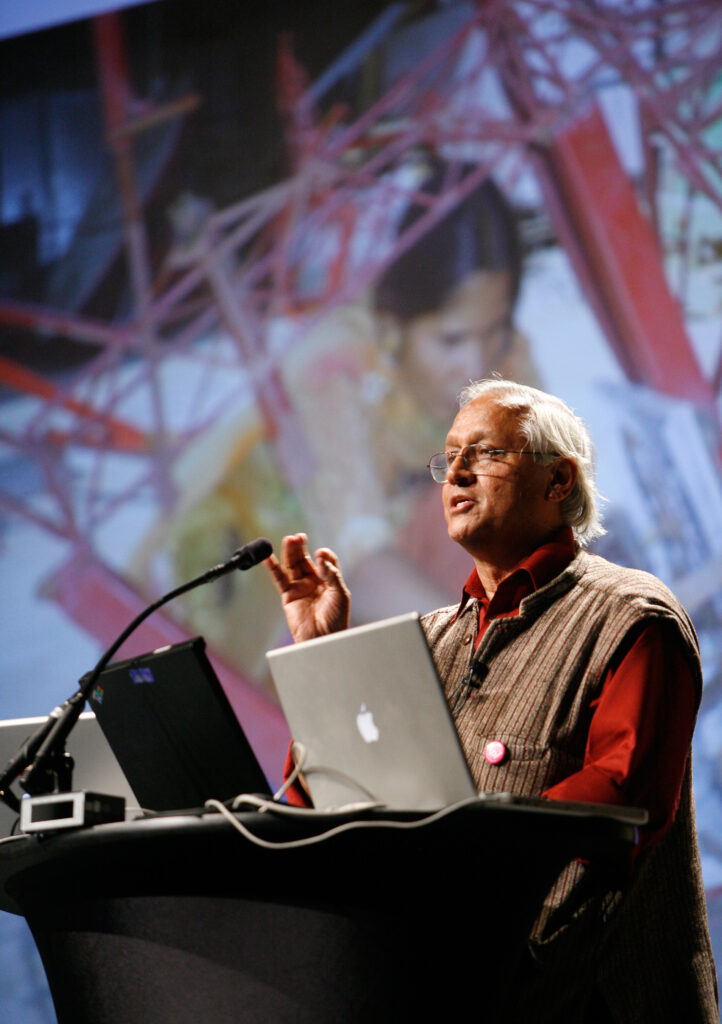Barefoot College

Credit: Pop!Tech
Licence: Creative Commons Attribution 2.0 Generic, via Wikimedia Commons
25 October 2008, 21:46:14
| Giver: | Individual |
|---|---|
| Receiver: | Registered Organization |
| Gift: | Time, Voice/Advocacy |
| Approach: | Philanthropy |
| Issues: | 10. Reduced Inequalities, 4. Quality Education, 5. Gender Equality, 7. Affordable and Clean Energy |
| Included in: | International Development, Philanthropy and Education |
Barefoot College is a grassroots organization based in Rajasthan, India. The school provides technical training to people from rural, marginalized backgrounds, supporting their ability to earn a decent living and contribute to their communities. Aligned with the philosophy of Mahatma Gandhi, Barefoot values the indigenous knowledge of rural villages, rejecting the idea that they need charity and expertise from urban specialists to solve their problems. Its mission is to work directly with the villagers themselves, democratizing information and demystifying technology so they can achieve self-sufficiency and manage their own sustainable development.
Barefoot College was founded in 1972 by Sanjit "Bunker" Roy. Born in 1945 to a distinguished family, Roy received an elite education, and originally seemed bound for a career in the private sector. His path changed dramatically after his first encounter with rural India in 1965, when he visited a village in Bihar where severe drought and crop failure were causing an escalating famine. Profoundly affected by the suffering he witnessed, Roy began to work on rural irrigation projects in Rajasthan, one of the driest states in India.
As Roy built relationships with rural people who lacked formal education, he became convinced that they only needed the opportunity to learn basic skills such as how to repair a water pump or install a solar panel in order to provide for their own needs. To this end, he established Barefoot College (originally the Social Work and Research Centre) in an abandoned tuberculosis sanitorium in the village of Tilonia, on 45 acres of land that he leased from the government for 1 rupee (about 2 cents) a month.
From its early days, Barefoot College has focused on seven core program areas: access to safe drinking water; night schools for children who work during the day to support their families; health care, including dental services, immunizations and pre- and post-natal care; environmental regeneration; communication through performance, art and technology; enhanced livelihoods through production and marketing of traditional hand crafts; and solar energy, which trains solar engineers to install, maintain and repair solar panels.
Barefoot College has had an enormous impact throughout India and in the dozens of other countries where its training models have been adopted. Today, Barefoot’s most innovative and wide-reaching initiative is its “Solar Mamas” program, which recruits and trains rural, often illiterate women from across the globe to become solar engineers in only six months. As of 2023, the program had trained more than 1,700 Solar Mamas, who have returned home to electrify more than 11,000 rural villages in 96 countries.
Throughout its history, Barefoot has remained true to its core beliefs that human dignity and self-confidence are key to overcoming material poverty, and that rural communities possess the knowledge and resourcefulness to become self-reliant. As Bunker Roy has been widely quoted as saying: "Listen to the people on the ground. They have all the solutions in the world." This philosophy has earned him recognition as one of the world’s leading social entrepreneurs.
Contributors: Maha Tazi, Erin Brown
| Source type | Full citation | Link (DOI or URL) |
|---|---|---|
| Publication |
Mininni, Giulia M.”The Barefoot College ‘eco village’ approach to women’s empowerment in energy,” Environmental Innovation and Societal Transitions, Vol. 42, Science Direct Journal & Books, 2022. |
https://bit.ly/3k9KOU6 |
| Publication |
O’Brien, Catherine. “The Barefoot College, or Knowledge Demystified.’’, Innovation Series, 11, 1996. |
ISSN: 1020=0800 |
| Publication |
O’Brien, Catherine. “Education for Sustainable Community Development: Barefoot College, Tilonia, Indua,” eScholarship@McGill, 1997. |
https://bit.ly/3kiVLTg |
| Publication |
Roy, Bunker; Hartigan, Jesse. “Empowering the Rural Poor to Develop Themselves: The Barefoot Approach,” MIT Press Direct, 3 (2), 2008. |
ISSN: 1558-2477 |
| Publication |
Kummitha, Rama Krishna Reddy. Barefoot as a Social Enterprise, Palgrave Macmillan, 2017. |
https://bit.ly/3ICaTVe |